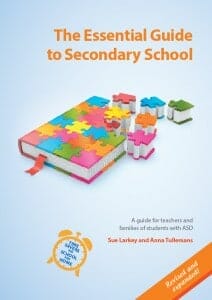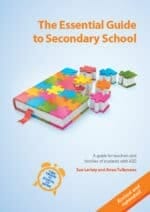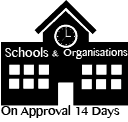Last year when I asked what people needed support, strategies and ideas for in 2016 many people wanted ideas for teens, secondary and puberty.
I have sourced a range of great resources for teens and also Anna Tullemans and I have Updated and Expanded “The Essential Guide to Secondary School”
PS: I highly recommend you start implementing these strategies from Year 5 onwards to ensure they are in place to prior to starting secondary education.
Below are:
- Quick Results in Secondary Schools: 6 Key Strategies
- 9 Essential Tips for Homework
- Link for Easy to Print Version of these tips on one page.
- Recommended Teenager (Upper Primary Resources)
 NEW Revised and Expanded Book:
NEW Revised and Expanded Book:
The Essential Guide to Secondary School
FREE POSTAGE FOR THIS BOOK UNTIL 4th March 2016
As there are so many more students currently accessing Secondary School, I have had many requests for strategies for Secondary School – so Anna Tullemans and I have revised and expanded The Essential Guide to Secondary School and sourced a bigger range of books for parents of teenagers, for teenagers themselves and for schools bottom of this page.
We have written this book as we see that education staff are very busy and required to support students with a large range of needs. We have provided quick tips, proformas, photocopiable pages and practical examples to help teachers and teacher assistants. By following the ideas in this book you will be able to help individual students with ASD reach their full potential.
This book is intended to guide you to create an ‘inclusive’ supportive school environment for everyone. We are using the definition of ‘inclusion’ according to the Salamanca Framework, International Framework for Inclusion: “The fundamental principle of the inclusive school is that all children should learn together, wherever possible, regardless of any difficulties or differences they may have.”
|
The Essential Guide to Secondary School: By Sue Larkey and Anna Tullemans Revised and expanded in 2016. A practical guide to secondary school. Ideas for all staff, from curriculum engagement, accommodations, group work, homework, using technology, behaviour support, organisational skills to building independence. Includes proformas to photocopy and save you time. This book has over 100 pages of proven ideas and strategies. CODE B02 $44.95 (Free Postage until 4 Mar 16) |
3 Essential Criteria for Inclusion:
To be effective inclusion must include all three of the following areas. Support of:
- Staff: The whole school must understand the individual student.
- Students: The other students must understand that everyone is an individual and support each other’s’ individual differences. (See Newsletter pg 2&3)
- Parents: There must be support and understanding from ALL parents in the school community.
Quick Results in Secondary School: 6 Key Strategies
In my experience one of the biggest challenges for staff and students is the number of staff involved with the student compared to primary school. Staff should endeavour to share what works and problem solve with the whole team. Reinforcement across all settings will build competence faster and will result in more success for staff and students.
- Think of each student as an individual. Support the age appropriate interests* and raise expectations towards independence and peer level behaviour as much as possible. (See book pages 5 and 6)
- Help the student build skills and independence. Nominate the behaviours/skills working on each week. Building competencies requires patience, setting priorities and establishing small goals to reach the desired outcome. (See book pages 14 and 16)
- Understand where the student is at and problem solve what is impeding his progress. Then develop the teachable, scaffolding steps that will help him move forward. (See book pages 26, 39, 40 and 68)
- Motivate to Success. Know what motivates a particular student. Knowing that this may be different to other typically developing students. Use this interest to focus attention on less interesting or non-preferred activities. (See book page 73)
- Effort Expected = Reward Offered. Ensure that the reward is substantial enough for the student to want to extend their effort. As a student becomes more familiar and more competent with new skills, his confidence, interest and motivation will increase and the need for rewards will decrease. Unfortunately for many of these students we need to use substantial rewards to engage them, as unlike their peers, intrinsic rewards are often irrelevant. (See book page 73)
- Small Steps of Success = Big Steps Forward. Shape behaviour by making small changes at a time and utilise reinforcement strategies, social (praise) as well as concrete (favourite activity). The reinforcement needs to have more value than the behaviour. (See book page 95)
*Age Appropriate Interests: Sometimes you need to replace earlier interests with new interests which can help build relationships with peers. Moving from Lego, to Minecraft, to computer games. Students need to be able to talk about the same topics as their peers. This is especially important in a mainstream classroom. The broadening of interests will encourage greater participation with others.
Homework
Keep in mind the very real stress and mental exhaustion that many of these students have at the end of the school day. The social aspect of school leaves them with an absence of breaks during the school day and for these students, school is for learning and home is for relaxation and time out. The ASD student needs downtime and that can usually happen at home where there is less pressure to constantly conform.
Be aware that often homework is completed but not handed in. This can be due to anxiety that it isn’t good enough or the teacher didn’t specifically request it and the student didn’t automatically hand it in. This is where home and school communication is vital. We recommend that as soon as a student doesn’t hand in homework contact the parents that day so it can be actioned immediately.
9 Essential Strategies for Homework
- Arrange Learning Enrichment / Tutor / Teacher Assistant to help formulate a homework plan.
- Only give two good resources from which to gather information.
- Use a tutor (not parents) to help with the homework.
- Choose which subjects require homework responsibilities, i.e. if he is good at maths he may not need to revise maths lessons with homework.
- Find the right time and place (not straight after school. Give them time to relax, eat and drink e.g. do reader in the morning rather than the afternoon).
- Keep homework short, with specific start and stop times.
- Think quality not quantity. Choose a few selected questions that cover the most important content or main ideas to support the lesson.
- Stay involved. Avoid doing the work for them. Give small rewards after doing a small amount of work or, reading and re-emphasising questions can sometimes help to get the right answer.
- Parents: sometimes if you sit at the same table and do your own work it can encourage the child to do theirs.
Excerpt from The Essential Guide to Secondary School by Sue Larkey and Anna Tullemans, page 58.




 Sorry we no longer ship items outside Australia. Please consider the digital versions of Sue’s Books –
Sorry we no longer ship items outside Australia. Please consider the digital versions of Sue’s Books – 